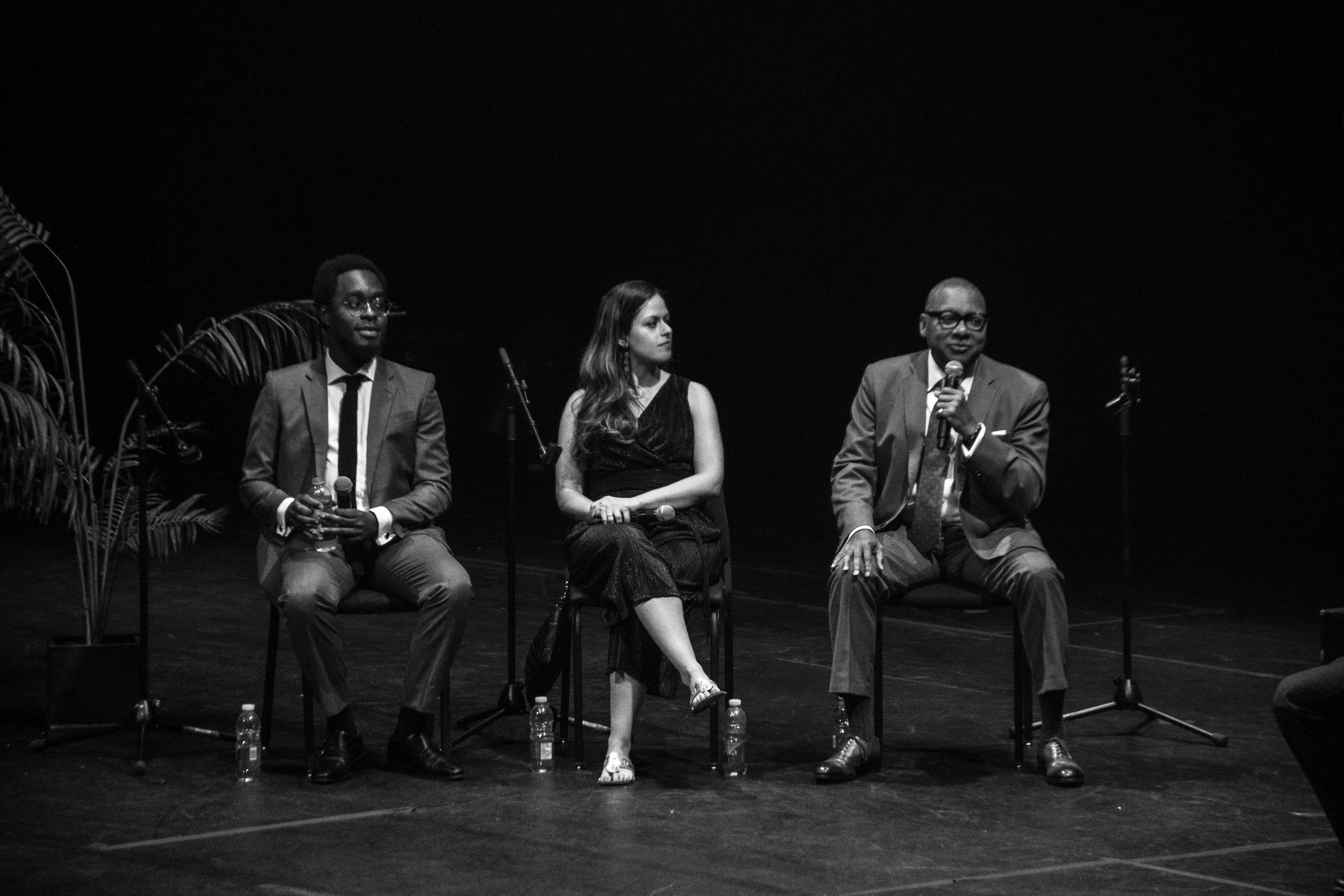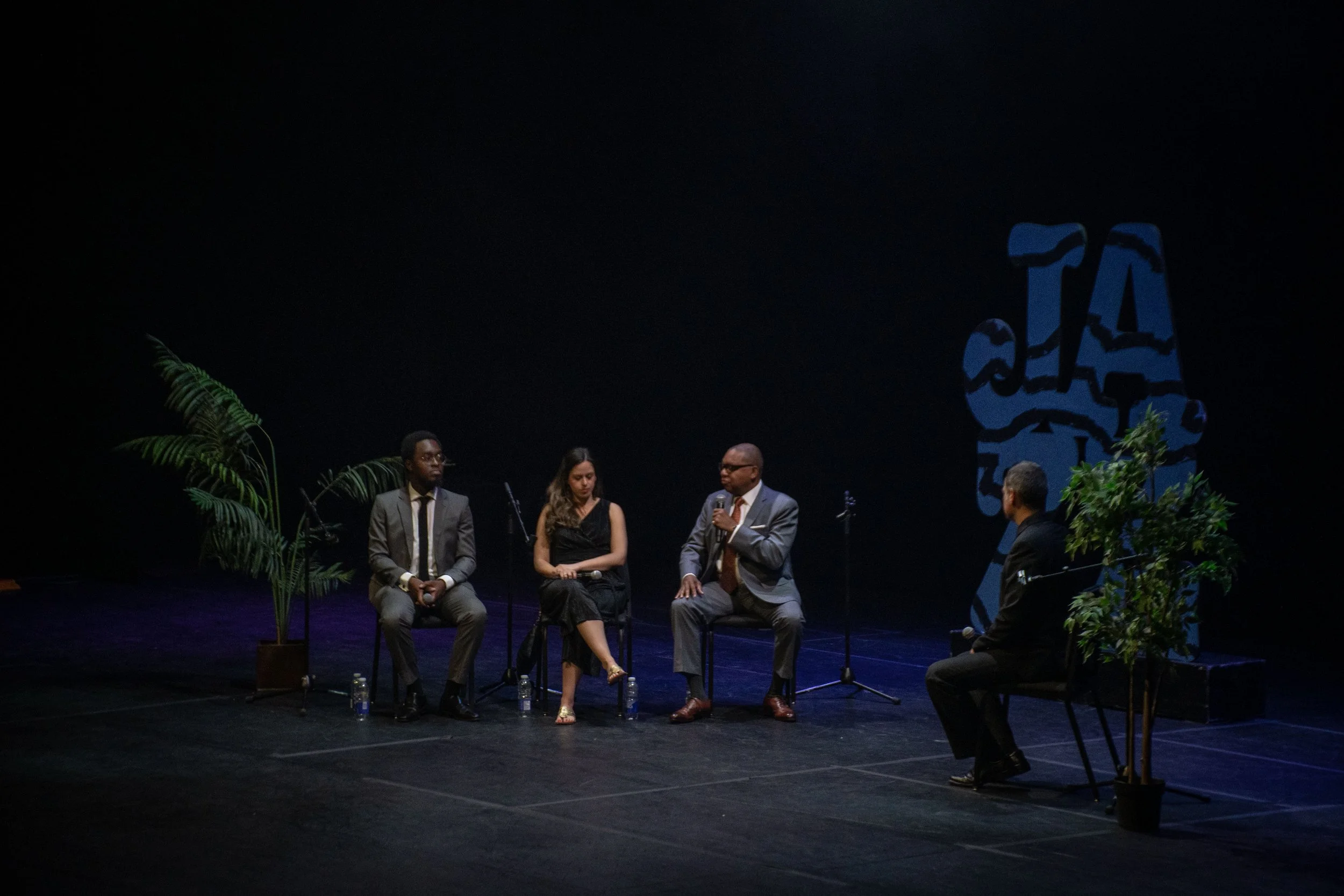The Double Edged Sword of the Digital Age: A Conversation on Jazz Today: “I don’t want a musical career, I want a musical life”
Review and photos by Eva Lynch
Fresh off a performance with the Lincoln Center Orchestra the night before, American trumpeter and LCO Artistic Director Wynton Marsalis sat down with newer LCO members Alexa Tarantino and Chris Lewis for a conversation with Samuel Blé about the state of jazz today, and what it means to be a jazz musician in a hyper-digital world. Quite quickly, the discussion focused itself on the tension between tradition and modernity. Blé’s questions tended to focus on social media and the consumption of music as content, which sometimes felt trite, however the responses from the musicians were thoughtful and refreshing and able to offer something new to the flood of discourse.
Chris and Alexa didn’t mince words, calling social media “the death of music.” They expressed concern about the performative nature of online culture—the pressure to constantly present oneself and cater to an invisible audience and the short attention span which comes with the digital age, both as consumers as well as performers, where people listen for 10 seconds and then keep scrolling. However, while the way we listen to music has greatly changed, so has the way we create and produce it which can have its own benefits. Chris describes a conversation with a mentor once where they said that each album you produce is a documentation of their development. Tracking how much you can change and improve across your life, and go back and listen to what you sounded like or played like 25 years ago, is incredibly valuable. Chris imparts that his biggest advice would be to put away your phone. He argues that if you’re listening to music, you’re missing something when you cannot solely focus on it. Further, when it comes to debates around social media, Chris calls on people to think about myspace, which is just gone now. To ask yourself, if your platform and social media was to go away suddenly, who are you? To him this is the difference between what you must do as a musician versus what you want to do to grow, claiming, “I don’t want a musical career, I want a musical life.” In contrast, Wynton Marsalis, who is now 63, said he couldn’t be less bothered by it. He reflects on how when he began in the industry, there was no way of traveling with music or discovering new artists. But now, he cannot believe how many albums are out there and how much you can listen to. It used to be that you’d tell people you were going on tour and they would say, ‘when you’re in Japan, Find this album,’ but now you can look them up. He says it still baffles him that you can look up a South African Jazz album from 1961 and listen to it and learn all about it, highlighting one of the hugest improvements which has come with the digital age.
Wynton goes on to joke though, that he loves social media because he says he will never truly be on it, so is thus saved from its pernicious effects. He compares it to his great uncle who was born in 1883, and never got used to the TV. For Wynton, he still sees the phone as something out of this planet and says he follows people’s young leadership on how to best use it, but agrees that it’s necessary to find a balance to everything, that’s the key to jazz. For him, jazz is our inheritance. Understanding those who came before you, to make the space nice and ready for the next generation. All three parties agree that social media has an immense influence on the younger generation more than older generations, but at its core, they are faced with the same struggle, which is learning how to be comfortable with themselves. This has always been the issue. Marsalis recalls earlier in his career when someone bought him a new trumpet because they thought something was wrong with it, then took it back and said, “it’s not the trumpet.” No one is perfect when they play, everyone is working on stuff. Chris speaks about how he's observed that with the digital age and social media, with young generations now, there are more chances to wish you were someone else you see online. There’s an innate jealousy complex which comes with being able to see people all over the world and feeling connected to them, which can be amazing, but also brings into question how you develop your individuality when you are constantly comparing yourself. Success in jazz has always been about finding a balance but knowing how to share space and lift people up. Making sure you can hear the bass in an orchestra, and giving everyone the space to learn and be themselves.
In response, Blé asks, “Is being a musician now harder than it used to be?” to which Wynton quickly replies, “No, it’s always been hard.” When he arrived in New York in ‘79, if you played Jazz, no one wanted to put it out. Labels and agents wanted European avantgarde, pop, and rock, so you had to be anything but yourself, which is hard when you care about the integrity of the music. All three artists agreed that above all else, at the heart of jazz is honesty and integrity. Speaking specifically about how they maintain the Duke Ellington Tradition, and how making music across generations requires honesty and collaboration as you engage in a constant discussion and cycle of feedback and creation together. How when someone presents a bad arrangement, they call it a turd and sometimes, it has to “get flushed.” Wynton recalls when he was a kid, his dad would talk about gigs, then he would go with him and it would be a raggety, empty bar, with a crowd of 5 people. So you realize, they must really enjoy playing because no one wants to listen to this. There is a need for humility and gratitude, that it means a lot to have even those five people listen to me and be moved by the music. So you always play. To any crowd, and especially to kids, and not lose sight of that importance in building a community. Wynton finishes the talk by expressing how the orchestra has to learn to function as a family, and jokes that he will continue to play with them until he has only one tooth left, and Alexa will have to hold the trumpet to his lips, and even then he’ll be happy to be doing it.








